Nutrition Essentials for Athletes
Nutrition Essentials for Athletes
Posted on: August 8, 2023 in NutritionWhy Is Nutrition Important For Athletes?
Athletes face unique challenges during training and competition. Nutrition can be another problem for an athlete, or it can be part of the solution. While nutrition is incredibly important, it is important to understand that nutrition is just one of many factors that contribute to total health.
Health is foundational for performance. Fitness and high performance cannot be built on a shaky foundation. While some elite and pro athletes have health conditions, they have found a way to manage them enough to train and compete at a high level. While it may be perceived that athletes do not need help with nutrition, the physical demands create challenges that the general public do not need to navigate.
Overall Health
How does nutrition support the foundation of health for the athlete?
Protein is used to create muscle, stimulate muscle growth, and prevents muscle breakdown. When planning protein intake for an athlete I have to consider the goals of the athlete, the type of protein, the amount of protein, and the timing of the protein.
A balanced diet high in fruits and vegetables provides a wide array of vitamins and minerals, which assist with metabolism. The antioxidants provided from fruits and vegetables are protective against disease, infectious and non-infectious. Fruits and vegetables also provide fiber, which helps to maintain our intestinal health by feeding the microbiome.
Grains and starches can be a great source of carbohydrate for many people. While refined grains are usually not ideal for the sedentary person, we know that they replenish muscle glycogen almost twice as fast as whole grains. Whole grains also offer fiber and a more complete nutrient profile for times when training is light or moderate in volume.
Dietary fat is an essential nutrient, meaning there are some fats that we need to function properly. Fats insulate our nerves, are used to build our cell membranes and hormones, and help transport nutrients that are not water soluble.
Each of these dietary components will also come with vitamins and minerals. Each individual food and food group offers some, but not all of the nutrients required to function optimally. Mixing and matching foods throughout your day and week are what we call “a balanced diet”.
The Athlete’s Plate is a great visual tool that can be used to get an idea for what a balanced diet looks like for various stages of training. Different types of work require different kinds of fuel. You will notice that more training means more carbohydrates. More training also means more refined carbohydrates and more cooked vegetables because these foods are digested much faster, allowing for faster recovery when it is needed.

Maximize training
Nutrition can help an athlete get the most out of their training program. This applies to any kind of training, whether it is geared towards endurance, strength, or a combination of the two.
A good training program will help an athlete perform better in a sport-specific manner. A runner will train much differently than a football player because the sports have different demands. Different types of training work by inducing adaptations that are beneficial to the specific muscle groups and energy systems used. This can be anything from increased muscle mass and strength to an increase in the efficiency of converting oxygen into energy.
There is always a limiting factor when it comes to performance. In other words, you are only as strong as your weakest link. Nutritional strategies can strengthen those weak links so that the body is more equipped to perform optimally.
Blood volume, for example, is often a limiting factor for endurance performance, as there is only so much blood to carry oxygen to muscles for performance. With consistent endurance training, the body can adapt to improve blood volume which increases the ability to deliver oxygen to working muscles. Having adequate iron stores allows for this oxygen to be distributed more effectively. One study found that among marathon runners, 48% of women and 15% of men were iron deficient. Other studies have consistently found that iron status is a concern among runners, particularly in women.
Nutrition can help to mitigate the limiting factors for performance for strength athletes too. One example is creatine. Creatine is the primary energy system during brief (10 seconds or less) and explosive movements. While creatine can be made within the body and is found in food, supplementation can help to sustain explosive performance throughout an explosive workout. Creatine levels begin high prior to a workout in a well-nourished athlete. The body has the ability to recycle creatine that is used, but over the duration of an intense workout, the body cannot replenish creatine as fast as it can be used. This is why creatine supplementation is effective. External creatine allows the body to perform better during explosive exercise for longer, allowing a greater stimulus to be provided to the muscles.
There are many supplements that help to mitigate the limiting factors. Limiting factors can also be reduced through a proper diet. For example, a distance runner or soccer player has a high demand for carbohydrates, because that is the primary fuel for this type of exercise. Eating a diet high in carbohydrates leading up to competition and during competition can allow them to perform better.
Maximize performance
Ultimately what every athlete really cares about is performing during competitions. It is irrefutable that nutritional strategies can improve competitive performance. There is no one size fits all model, so these strategies are specific to the individual and the sport.
One study was able to show that Indy car drivers who had optimal blood sugar levels performed better and had a significantly better reaction time. While we may not think of Indy car drivers as the athletes to be most affected by nutrition, this demonstrates how valuable nutrition can be for any athlete, regardless of sport.
Other studies have found that by supplying the body with different types of carbohydrates, the ability to burn carbohydrates as fuel can be increased by 50% or more, which offers massive advantages for those in endurance sports like running and cycling. These are just a couple of examples of the relationship between nutrition and competitive performance.

Hydration
Hydration is a balancing act. Optimizing hydration is another key to performance. Hydration is not simply a matter of enough water, but a balance between water and sodium. In the right conditions, an individual can sweat 7g of sodium in a single day. Replacing electrolytes in cases of extreme sweating can be a life or death situation.
Until advances in sport science, marathon runners would rehydrate with water alone, which resulted in a dangerous dilution in blood sodium, hospitalizing many and even resulting in some deaths. This is also known as water intoxication.
Losing too much water from sweat can also impair performance. Water is important for keeping muscles and internal organs at a cooler temperature. Performance typically begins to decrease once an athlete loses 2% or more of their body weight through sweat. Replacing the water lost through sweat can prevent performance from tanking. For each pound lost through sweat, it is recommended that it is replaced with 1.5 lbs of water. Sweat rates can be measured relatively easy by a trained professional.
Believe it or not, there is also a science to sports drinks. Carbohydrates offer energy, and electrolytes that are lost through sweat. A scientifically formulated sports drink is 6-8% carbohydrate by volume. You can find the percent carbohydrate of your sports drink by dividing the grams of sugar by the milliliters of liquid and then multiplying the result by 100. A sports drink that is less than 6% or greater than 8% carbohydrate can cause intestinal issues that may impair performance. Generally, a sports drink is only beneficial for exercise lasting about 60 minutes or more. Since humans have carbohydrate receptors in the mouth, simply swishing a carbohydrate-based sport drink without swallowing can improve performance.
Minimize Illness
Lean on good nutrition to keep you healthy enough to compete.
They say the greatest ability is availability. A big part of being a competitive athlete is traveling. Traveling to different regions, states, and countries comes with the inherent risk of being exposed to foreign bacteria and viruses. Building a strong immunity offers added protection against these pathogens that could otherwise keep you from competing or performing optimally.
Nutrition can prevent illness in a few ways. It can provide nutrients like vitamin C to help strengthen the internal ability to fight off viruses. In other cases, foods such as garlic, have anti-viral and anti-bacterial contain compounds that help to fight off pathogens that might otherwise enter the body through the digestive tract.
One of my mentors was a dietitian for team USA’s Olympic speed skating team. She became famous for her “immune bomb”, a supplement shot made with garlic, citrus, rosemary, and a few other ingredients designed to rev up immunity for international travel. This is a common practice for athletes traveling internationally.
Strengthening the microbiome is one way to bolster immunity for domestic and international athletes. The microbiome is a term used to describe the bacteria that live in our digestive tract. Because 70-80% of our immune cells reside in the digestive tract, it is important that the bacteria lining the intestines work in synergy with our body. The microbiome can be strengthened by eating fiber, consuming fermented foods, and diversifying the plant foods in your diet.
Improve Recovery
How can nutrition support recovery?
Training and competition create a degree of physical stress. This stress creates the need for recovery. While the human body has an incredible ability to heal itself, it needs the proper nutrients to repair. Neglecting recovery can result in a decreased training capacity and impairs competitive performance as well.
When people think about nutrition and recovery, protein usually comes to mind. While protein can help with recovery, I would like to highlight some lesser-known recovery strategies. Many collegiate and professional sports teams buy tart red cherry juice in bulk. Why? To facilitate recovery by providing powerful antioxidants that help to reduce muscle soreness and accelerate repair. Omega-3s in the form of fish oil have been shown to have a similar effect.
Carbohydrates are under-appreciated when it comes to recovery for the athlete. Carbohydrates are actually more important following a strength workout than protein for muscle growth. Why? Muscle growth is secondary to fueling our primary energy systems. Protein is not a primary source of fuel, so the body prioritizes the storage of carbs. When the carbs are stored, the internal environment is then primed to store protein in the form of muscle following strength training.
An athlete can maximize a training stimulus to resistance training by fueling appropriately prior to exercise, and refueling optimally after exercise. Refueling with carbohydrates and protein 30 minutes following a lift will allow you to recover faster and stimulate more muscle growth than the same meal at 3 hours after the workout. Similarly, consuming 30 grams of protein following a strength workout will provide more opportunity for muscle growth than the same type of protein in a 10-gram dose. The type of protein also influences the muscular response to training adaptation.
Injury Recovery and Prevention
Injuries are an inevitable challenge for any athlete, whether competitive or recreational. While you may not immediately associate nutrition with a muscle tear or a bone fracture, nutrition plays a role in the occurrence and recovery from these conditions. A traumatic injury like this increases the need for protein and calories.
Nutrition plays a massive role in injury prevention. Elite athletes get all kinds of fancy tests around the calendar year. One very valuable test is a bone mineral density (BMD) test. A low BMD means that the athlete is at a higher risk of bone fractures. The low BMD may indicate that the athlete has a diet that does not support their nutrition needs. Screening for these types of issues provides opportunity for a nutritional intervention before a fracture. These issues are common in runners who get stress fractures.
Brain Injury Recovery
Nutrition appears to even help minimize the damage caused by a brain injury through inflammatory management. Taking fish oil, or another concentrated source of omega-3 fats has been shown to improve markers of nerve damage in football players. Omega-3 fats are a structural component of nerves and can be used following a brain injury to repair damaged nerves. The omega-3s also act as signaling molecules that prevent the inflammatory cascade from getting out of control, which can cause unnecessary harm.
Using omega-3s for brain injuries is unfortunately one of the best-kept secrets in sports nutrition. The omega-3s are effective and safe (up to 5 grams per day). There are currently no FDA-approved drugs to treat brain injuries, and for many sports like football, brain injuries are just another occupational hazard. Dietitians in the UFC, NFL, and our military special forces all use omega-3s with their athletes and soldiers to help improve outcomes from brain injury.
Weight management
Weight management is important for any athlete. For many athletes, they want to maximize their power-to-weight ratio, or be as strong as possible at the lightest weight. This results in many athletes focusing on their physique and percent body fat instead of indicators of performance. Athletes often sacrifice performance for physique and need to be reminded that the lowest body fat % does not correlate well with performance.
Losing weight too rapidly can be a detriment to both health and performance. In order to maximize the effect of training, it is important that an athlete has the proper nutrients for fuel and recovery. If an athlete is on a low-calorie diet that is deficient in calcium, the body will adapt by pulling calcium from bone, which can compromise bone structure. Aggressive weight cutting can cause health problems when there is not enough caloric energy to meet the demands of training and competition.
High protein diets are the most widely accepted strategy for weight loss. Protein contributes to a feeling of fullness, so if the diet is not high in calories, the protein may help to feel fuller while eating less. Protein also helps to prevent muscle breakdown during weight loss.
Gaining weight is another challenge for the athlete, as many athletes are considered “under-sized” or “not strong enough” for their position or sport. Muscle gain is a slow and steady process, but one that certainly needs the right conditions from nutrition. If you try to gain muscle too fast, excess protein can be converted to fat, which is likely to conflict with your goals. For those looking to add muscle, protein timing is an important concept to understand.

Summary
The 5 Bridges to total health also apply to performance. Nutrition can increase exercise performance, enhance recovery, and be part of the education that helps an athlete stand-out. Food can also be a powerful way to build community. If you want to take your performance to the next level, check out our nutrition page to schedule a consultation.



